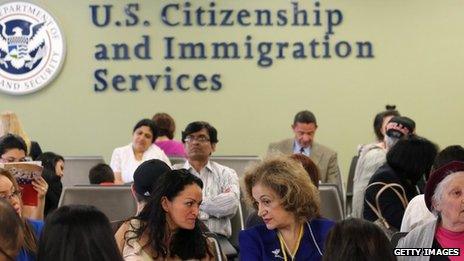US Senate immigration bill starts debate
- Published

The US Senate has begun debate on a far-reaching immigration bill, with a vote expected before the end of June.
The bill has bipartisan support in the Senate but faces a tough fight in the House of Representatives, which is currently negotiating its own bill.
Some Republicans criticise the Senate bill's push to provide a 13-year path to citizenship for such immigrants.
Senate Majority Leader Harry Reid opened debate on Friday, calling the current immigration system "broken".
"It is gratifying to see the momentum behind this package of common-sense reforms, which will make our country safer and help 11 million undocumented immigrants get right with the law," Mr Reid said.
Healthcare issue
One of the leading supporters of the bill, Republican Senator John McCain, said he is confident the bill will receive the 60 votes it needs to clear procedural hurdles.
"There are some real concerns about border security that we have to work through, but I'm confident that we will be able to do so," Sen McCain said.
The bill currently includes $6bn (£3.8bn) to strengthen US border security, a key demand of conservatives.
Other Republicans say the bill would reward those who broke the law by entering the US illegally.
"We can't reject a dutiful, good person to America and then turn around and allow someone else who came in illegally to benefit from breaking our laws to the disadvantage of the good person," said Republican Senator Jeff Sessions of Alabama, a leading critic of the bill.
Sen Sessions also raised eyebrows during the start of debate on Friday by saying "the federal government has reached a point now where virtually no one is being deported, except those convicted of serious crimes," ABC News reports, external.
But US immigration officials deported about 400,000 people in the past year, according to official figures, external, about half of whom were convicted criminals.
Correspondents say many Republicans acknowledge the need to embrace reform, given that Hispanics - an increasingly key voter bloc - overwhelmingly chose Barack Obama in last November's presidential election.
In the House, similar legislation is coming up against concerns over the status of taxpayer-subsidised healthcare for undocumented immigrants who aim towards citizenship.
Republican Representative Raul Labrador stepped down from a bipartisan group discussing a companion immigration bill in the House, citing the healthcare issue.
The Senate bill would bar immigrants in "provisional" legal status, the first step - envisaged by the Senate bill - towards permanent residency and citizenship, from receiving taxpayer-subsidised care.
Only after 10 years and once applicants receive a green card would they be able to qualify for tax breaks while buying medical insurance under President Obama healthcare reform law.
Mr Labrador said the House group, whose negotiations over the issue are not public, have not been able to resolve the healthcare issue.